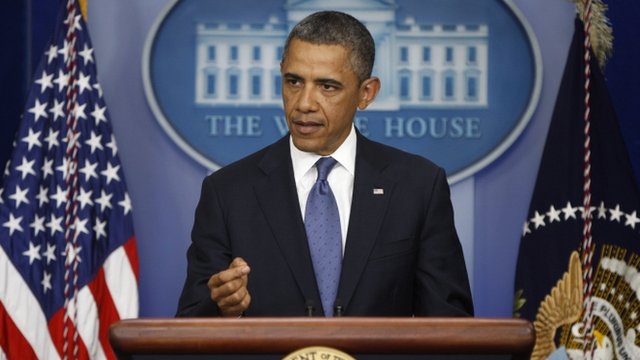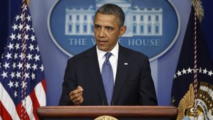In a sense, Rouhani is right: There is no duly negotiated, approved and signed agreement to tear up. What we have is a fiction that Obama, helped by the Rafsanjani faction in Tehran and the European Union, has sold to world public opinion.
What Trump will face is a jumble of deceit and deception that commits no one to anything specific in any verifiable way.
To pull that particular rabbit out of his hat, Obama circumvented the US Congress, persuaded his Tehran partners to lead the Iranian legislature up the garden path, conjured a shadow Security Council and inspired a 179-page press release known as Comprehensive Joint Plan of Action (CJPOA), which no one has signed and no legislature has ratified.
For the past year, the mullahs of Tehran have pretended that CJPOA is a bona fide international treaty under which all sanctions imposed on Iran will be lifted. However, CJPOA commits no one to anything.
To be sure Obama has used it as an excuse to suspend some of the sanctions against Iran, something that any US president has the right to under the very law that imposed the sanctions in the first place.
In exchange for Obama’s suspension of some sanctions, Tehran has agreed to a set of mostly cosmetic concessions that leave its nuclear program intact while helping Obama boast about having “definitely blocked” Iran’s path to building the bomb.
Tehran had hoped that the confidence trick played by Obama would continue under a President Hillary Clinton. After all, Clinton had piloted the first secret talks held in Oman with the mullahs, and was committed to continue Obama’s overall foreign policy options especially with regard to Tehran.
With Obama gone and Hillary jettisoned, the mullahs know that the CJPOA may be exposed as a sham. This is why since Trump’s election they have started referring to a United Nations’ Security Council Resolution No. 2231 as the basis for the non-existent agreement.
Resolution 2231 is an interesting document. It is supposed to abrogate and replace Security Council resolutions 1969, 1737, 1647, 1803, 1835 and 1929 passed between 2006 and 2010.
All those resolutions, at least in part, were passed under the famous Chapter Seven of the UN Charter that keeps the door open for taking military action against violators of council decisions.
Normally, Tehran should have been glad that all those resolutions were abrogated, thus removing the theoretical threat of military action against Iran.
However, determined to exploit Obama’s weakness, or goodwill if you prefer, to the maximum, the mullahs played their ancient rejection tune certain that whatever they did or didn’t do, good old Barack wouldn’t make them pay for their defiance.
With Trump in charge, the mullahs fear he may refuse to play Obama’s diplomatic charade and insist that the “Iran problem” be dealt with in a serious manner. This is why they have suddenly started casting themselves as ardent defenders of Resolution 2231 and thus of “international legality.”
All this provides Trump with a number of options. He could demand that Tehran formally and officially accept resolution 2231, which could be used against it in a diplomatic jujitsu. For articles 11 and 12 of the resolution enable any member of the Security Council to bring a case alleging non-compliance by Iran.
That would trigger the so-called snap-back process under which the council would have to review the whole situation again and come up with a new decision within 30 days.
If there is no accord after 30 days, the six previous resolutions would be re-activated with suspended sanctions re-imposed by all UN members. Thanks to its right of veto, the US would be able to prevent any new council decision that might try to fudge the issue.
So far, thanks to Obama’s generosity, the mullahs have been able to practice a la carte diplomacy, accepting what they like and rejecting what they don’t while pretending that they are complying with UN resolutions.
They have been helped in this stratagem by the European Union foreign policy tsarina Federica Mogherini who has somehow tagged herself on the so-called P5+1 group, in fact making it P5+2 without having been given any specific mandate by the EU.
With resolution 2231 highlighted as the foundation of any accord, the P5+1 or +2 could be consigned to the trash can as a figment of Obama’s imagination with no legal basis and solely designed to take the mullahs off the hook as far as the real Security Council is concerned.
Trump’s other option is to do nothing unless the mullahs do something specific and verifiable regarding their nuclear program. And doing nothing includes not extending Obama’s suspension of sanctions against Tehran. Obama specialized in giving “gifts” to America’s enemies without even asking for anything in return.
Trump should show that the US is no longer in the business of giving something for nothing. As a businessman he could practice a give-and-take diplomacy; if the mullahs really freeze their nuclear program then sanctions imposed on them with regard to that issue could and should be suspended in a just and proportionate way.
Helping the mullahs understand that the party-time they have enjoyed under Obama is over would be good for the US, for Iran and for the whole world.
After eight years, America’s friends and foes may resume treating it with respect as a power that does not build its diplomacy on trompe-l’oeil motifs.
It would also be good for Iran because the mullahs might begin to understand that their actions have consequences and that at some point they must admit they cannot trample every rule of responsible behavior not to mention international law, under their feet.
It would also be good for the world because, like it or not, Iran is a major source of instability and tension in the Middle East; change of behavior could contribute to finding solutions to most of the region’s current geopolitical problems.
The end of Obama offers a golden opportunity for tackling and solving the “Iran problem” in everyone’s interest, including and above all Iran itself. Trump should not miss that opportunity.
• Amir Taheri was the executive editor in chief of the daily Kayhan in Iran from 1972 to 1979. He has worked at or written for innumerable publications and published eleven books.
* Originally published in Asharq Al-Awsat









 Home
Home Politics
Politics











